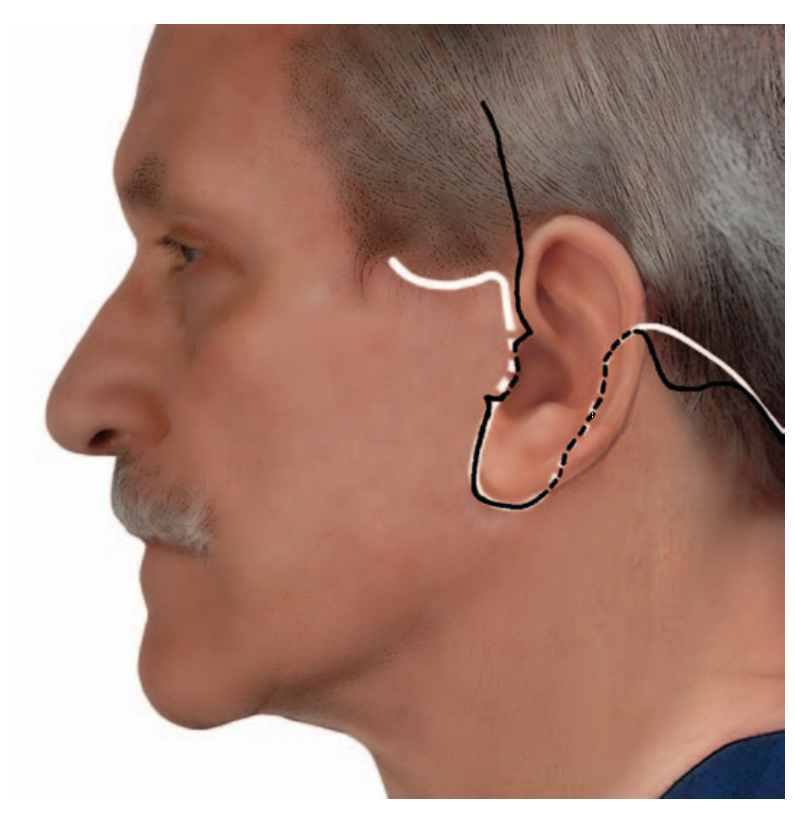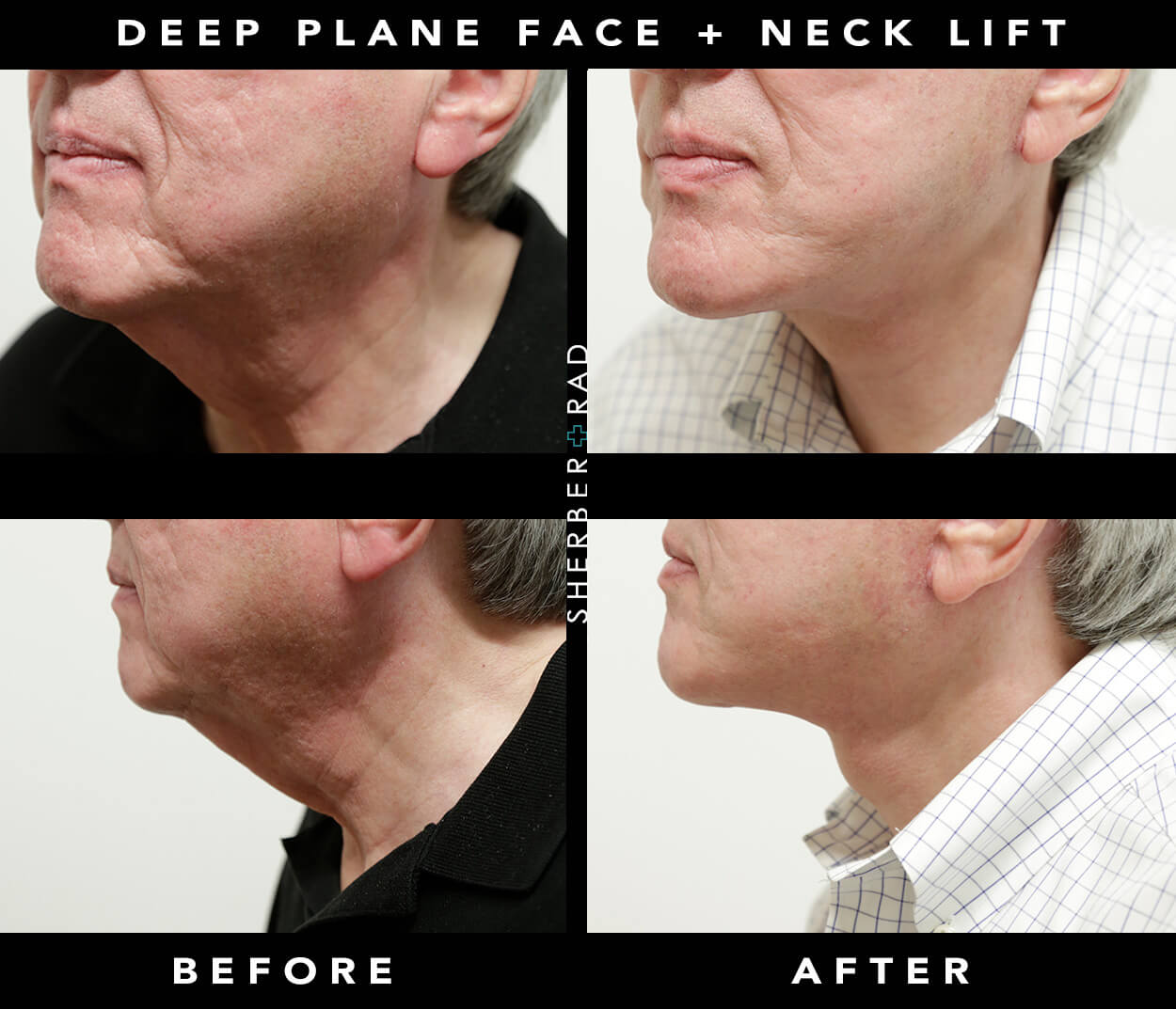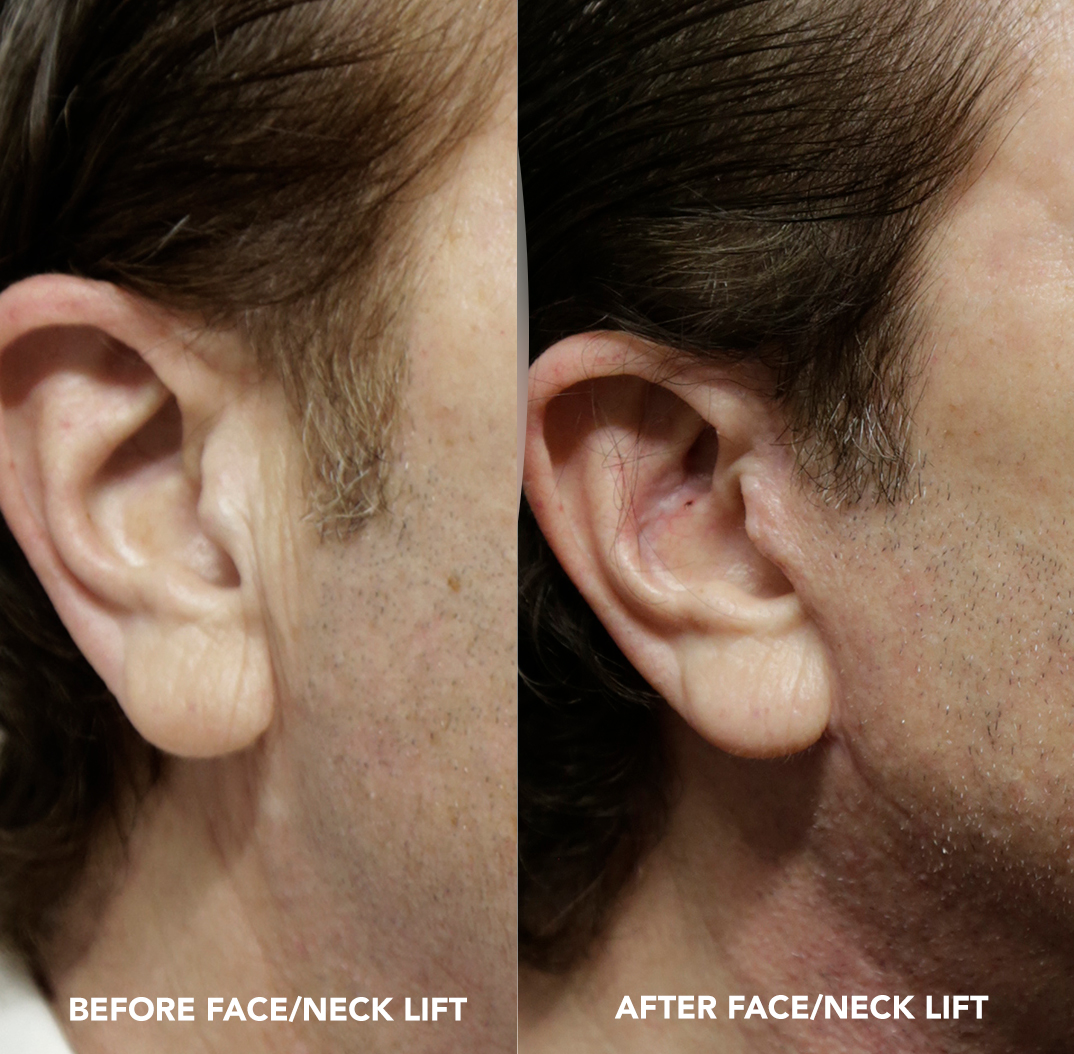- Dermatology
- Plastic Surgery
- Ariel N. Rad, M.D., PH.D.
- Face Cosmetic Surgery
- Breast Cosmetic Surgery
- Body Contouring
- Breast Cancer Reconstruction
- Destination & Travel Package
- Gallery
- Testimonials
- Boutique
- PRESS + BLOG

In the United States male facelift is one of the most sought after procedures to restore youthfulness and confidence and Dr. Rad’s Washington DC facelift patients seek a naturally refreshed appearance that conveys vitality, energy and influence. Sagging necklines, weak jawlines and deep furrows and nasolabial folds often convey the opposite which, in this technological age of Zoom and social media driven communication, men are paying more attention to their facial appearances. Never before has the need to look youthful and relevant been so important.
Men have unique needs with respect to facelift surgery. Different from female facelift, male faces are defined more by a square and chiseled jawline, a powerful and prominent chin, relatively flat midface (cheekbones) and low set eyebrows. Dr. Rad’s focus in male facelift in Washington DC is to maintain and enhance masculine contours that appear more chiseled, angular and structured as compared with the soft, heart-shaped contours for which he aims in his female facelift patients.
Male facelift is also unique due to hairstyle. For example, men who wear sideburns require modification to the facelift incision pattern and direction of lift so as not to distort the hairline. For men who wear their hair short and for those who are bald, meticulous incision placement and closure is essential to hide scarlines and to optimize their healing. Dr. Rad’s relies on his signature “minimal incision, ten-layer” facelift technique in men who have good skin tone, reasonably good skin elasticity and who cannot tolerate scars around the ears. In these patients Dr. Rad works through three 1.5 inch incisions, behind the ears and under the chin, through which he sculpts 10 key tissue layers for comprehensive face and neck sculpting.
Suffice to say that there are many details that must be considered uniquely for the best male facelift results and Dr. Rad’s expertise in this niche is unparalleled.

Men who are generally healthy (no cardiac, pulmonary or kidney diseases), who are non-smokers (smoking severely compromises wound healing) and who have reasonable goals and favorable anatomy may be good candidates for facelift. Dr. Rad is often asked by patients whether this is the right time for facelift, and through detailed discussion he will advise you candidly about the advantages and disadvantages of facelift surgery. The 10 most common reasons male patients seek facelift are as follows:
1. You have had a change in your professional life, perhaps making you feel the need to look more youthful, energetic and commanding.
2. You have had a change in your personal life such that attracting a partner has become more important.
3. You are concerned that you look older than your actual age which causes you to feel more pressure in the workplace or in your social life.
4. You have tried non-surgical treatments and you now want a more significant and/or permanent improvement.
5. Your busy schedule does not favor multiple visits and so a “one and done” refresh is appealing to you.
6. You are interested to reverse the early signs of aging rather than waiting for greater laxity to appear which may require a more significant “overhaul”.
7. You have a big life event forthcoming, perhaps a wedding or professional occasion, and you want to look fresh and confident.
8. You want to improve certain problem features such as blunted jawline or weak chin.
9. You have lost a lot of weight and now see looseness in your facial tissues.
10. You view your success or livelihood to depend on looking and feeling your absolute best.
This 54 year old man wanted to refresh his appearance and he was most concerned with loose neck and jawline tissues. Dr. Rad treated him with deep plane face and neck lift in Washington DC which sharpened his neck and jawline, smoothed nasolabial folds and marionette lines.
Sherber+Rad cannot guarantee specific results.
Individual results may vary.
When there is significant skin looseness and Dr. Rad’s “scarless” approach is not suitable, then facelift incisions that pass around the ears require the deep plane approach. Face lift scars for a man varies depending on the degree of skin laxity and the pattern of hair in front of the ear. In terms of skin laxity, the general rule of thumb is that the greater the looseness the longer the incision must be. The reason for this is because, when excess skin is smoothed and “redraped” in a diagonal direction, it would otherwise bunch around the ear unless the incision is extended appropriately transition contour smoothly from cheeks and neck to the ear. Prematurely ending the incision line will cause “dog ears” which is a term used to describe the bulging of extra skin at the ends of incision lines that were not extended long enough. Therefore, a skilled surgeon must prioritize smoothness of contour rather than incision length. The art of facelift incisions in men lies in 2 aspects: (i) incision placement in front and in back of the ear, such that they are optimally hidden from view, and (ii) how much tension is pulling on the incision line which determines how well scars heal and how much ear structures distort. A highly skilled surgeon will optimize both aspects as follows.
 With respect to incision placement, let’s consider the incision line in front of the ear, and then also in back of the ear. Generally speaking, incision placement must be precise and meticulous to follow the undulating hills and valleys of ear structures. Not doing so, by placing a straight line incision in front of the ear, makes the scarline very conspicuous.
With respect to incision placement, let’s consider the incision line in front of the ear, and then also in back of the ear. Generally speaking, incision placement must be precise and meticulous to follow the undulating hills and valleys of ear structures. Not doing so, by placing a straight line incision in front of the ear, makes the scarline very conspicuous.
Instead, Dr. Rad takes great care to place his incision following the natural contours of the ear as follows: first, curved around the helical rim (top curved part of the ear), then behind the tragus cartilage (“retro-tragal”), then at a 90 degree angle around the incisura (the structure between tragus and earlobe), and finally curving then around the earlobe just outside its junction with the facial skin. Dr. Rad frequently sees patients for revision work because of poorly placed scarlines which most commonly is straight down in front of the ear. The rationale given to patients is that there are often wrinkles in front of the ear in which to hide the scar. While logical in concept, it does not result in less conspicuous scar because after facelift the wrinkles will have been smoothed and the white scarline is then quite visible.

Incision placement behind the ear should follow the natural crease where the ear meets the head, and then transitions to the hairline and into the hair-bearing scalp. A meticulous surgeon tailors the incision line to each patient’s unique anatomy and degree of skin laxity: when there is minimal skin laxity, then Dr. Rad routinely extends the incision into the hair-bearing scalp, whereas with significant skin laxity Dr. Rad places the incision line along the hairline rather than extending it into the hair-bearing scalp, in order to avoid a “stair step” or “zig zag” hairline deformity which can be very difficult to correct. Suffice to say that Dr. Rad has extensive experience correcting these problems in patients treated by other surgeons.
Incision placement also relates to whether a man wears sideburn hair or a beard. In this case, when the excess skin is pulled up, the sideburn hair and beard hair can be pulled onto the ear structures, or directly adjacent. To avoid this, the meticulous surgeon will direct skin redraping in a more vertical direction so that hair-bearing skin replaces hair-bearing skin, rather than the hairless skin in front of the ear. The other delicate maneuver that Dr. Rad routinely employs is very precise cautery (“burn”) of the hair follicle bulbs in the region of skin that is in front of the ear in a precise pattern that recreates the contour of the sideburn and beard hair. This is a delicate move because there is a fine line between clearing the unwanted hair from ear skin and potentially burning the skin and causing skin necrosis. Needless to say there are many details to which your surgeon must pay close attention, and of course Dr. Rad does so with every one!
With regard to how incisions heal, it is essential for incision lines to have ZERO tension. Think about a rubber band – if you pull on it, the rubber band widens and eventually the band will stretch out. However, if you let the band be in its natural resting state, then it does not widen and does not stretch out. Skin acts the same way: it has elasticity like the rubber band and scars will widen and skin will stretch when pulled with tension. This causes terrible looking scars and distortions of the ear that can be very distressing to patients. The only way not to have tension is to redrape skin in a way that allows the skin to lay gently in place, rather than pulling the skin tightly. This is essential for optimal scar healing!
 Dr. Rad treated this middle aged male with deep plane face and neck lift. Notice that scars are unnoticeable because of precise placement of the scar line following natural hills and valleys around the ear structures, zero tension pulling on ear structures, and meticulous management of beard and sideburn hair distribution. This result is 6 months post-op.
Dr. Rad treated this middle aged male with deep plane face and neck lift. Notice that scars are unnoticeable because of precise placement of the scar line following natural hills and valleys around the ear structures, zero tension pulling on ear structures, and meticulous management of beard and sideburn hair distribution. This result is 6 months post-op. This is a very common concern that Dr. Rad addresses with his male facelift patients. While Dr. Rad always performs facelift with the highest level of attention to detail, the need for virtual imperceptibility of scarlines is great in male facelift patients, particularly if they wear short hair or are bald. While individual tendencies for scar healing is largely genetic, there are many details that go into incision management in order to optimize scar healing for men.
Incisions closed under tension notoriously heal poorly and cause many visible problems. Most notably, scars tend to be wide, hypertrophic (thickened), and distort ear structures such as the tragus (called “ear canal show”) and earlobe (called “Pixie ear deformity”). These undesirable distortions are difficult to correct and typically require a revision facelift. Therefore, doing the facelift right the first time is of paramount importance and management of tension is essential. This means that, while deeper tissue layers, I.e. the muscle layer, may be holding significant tension, the skin incision line should not. Skin does not have tensile strength and tends to stretch out, and will do so at the “weakest point.” As the saying goes, “a chain will break at the weakest link”, so too will a scar widen because it is weaker than native skin. Furthermore, tension placed erroneously at ear structures will distort their features. These telltale signs of a poorly executed facelift are to be avoided. For these reasons, Dr. Rad’s deep plane facelift technique places tension on the deep muscle layer and zero tension on the skin incision line making his facelift results second to none.
As one of the most well-regarded plastic surgeons performing Facelift in Washington DC, Dr. Rad is here to answer all your questions about Facelift. To confirm whether you are an ideal candidate for Facelift, Contact Us today to schedule your in-person consultation.


Our plastic surgery office in Washington DC is centered on your comfort and privacy. You’ll be received by our exquisitely attentive staff, and escorted to your own private cabana wherein you’ll feel relaxed and comfortable while consulting discreetly with Dr. Rad. First Dr. Rad will determine if you are a good candidate for surgery and during your consultation you should decide if Dr. Rad is the right surgeon for you. Credentials are crucial and, in addition to being Board certified in plastic surgery, Dr. Rad is Assistant Professor at Johns Hopkins, and he enjoys an impeccable reputation as a top flight aesthetic surgeon. His facial plastic surgery expertise is sought out as one of the best surgeons in Washington DC, northern Virginia and the US. Your safety is Dr. Rad's primary concern and he will review your medical history. You should inform Dr. Rad of any medical problems or medications that may affect your healing. If you are medically appropriate to undergo surgery then Dr. Rad's focus will be to understand what specific aesthetic concerns you have. Washington DC patients expect natural results with minimal downtime. Dr. Rad will spend time carefully listening to your concerns, asking clarifying questions and then masterfully guiding you, step by step, to understand how your unique anatomy can be improved to convey a rested appearance. Dr. Rad’s goal is to determine the most comprehensive approach for long lasting, natural results while minimizing downtime. Dr. Rad first needs to understand your specific concerns and you should prepare your thoughts prior to your consultation. Think of words that convey how you feel about your appearance. For example, Washington DC patients often say they look fatigued, tired or lackluster because of undereye bags or dark undereye circles, or they look sad, upset or disinterested such as from heavy eyebrows, excess skin above the eyes or downturned corners of the mouth. Patients often relate concerns of looking older than how they feel and this can be caused by jowls, nasolabial folds, loose neck skin, lines and wrinkles. Try to put into words how your appearance bothers you, and the priority you give to each area. Dr. Rad will then present to you his expert opinion about which procedures would be best to restore your anatomy to create a rested and refreshed appearance. And since surgery is intricate Dr. Rad will guide you through a stepwise approach of aesthetic analysis and he’ll deliver his recommendations in a clear and honest manner. Dr. Rad will present all options available in modern day surgery, both non-surgical and surgical. Dr. Rad and Board certified dermatologist Dr. Sherber often collaborate to optimize patients’ results and to minimize invasiveness. As such Dr. Rad’s modern approach to surgery harnesses the power of both dermatology and plastic surgery as both specialities address different aesthetic challenges. For example, plastic surgery is effective to lift, tighten and volumize loose, atrophied tissues, whereas dermatologic treatments such as laser, radiofrequency tightening and skincare are best to improve skin texture, pigmentation and tone. Dr. Rad can address any concerns regarding skin quality and how to obtain and maintain optimal results. Dr. Rad will review with you photos of his patients’ results (many of which you’ll not find online due to privacy concerns) to highlight his aesthetic approaches and skill. He will take your photographs, which remain confidential, to assist with the planning of your surgery. For your safety Dr. Rad performs surgery in a hospital-based operating room, considered to be the safest environment, rather than in the office. Anesthesia is delivered by a board certified anesthesiologist (MD) and you’ll be under light anesthesia which is important for your safety and comfort. You will receive a customized quote for the procedures in which you’re interested. Once approved we may then move forward with pre-operative preparations and you will meet with Dr. Rad again at your final in person consultation prior to surgery. Dr. Rad’s reputation as one of the most technically gifted surgeons attracts patients nationally and from around the world. We cater to patients from across the globe by arranging virtual consultations, luxury accommodations at The Jefferson hotel, Washington DC’s most luxurious 5 star boutique hotel, as well as private nursing care. Your privacy, comfort and safely achieving exceptional results are our top priorities.

WHAT CAN I EXPECT FROM MY CONSULTATION WITH DR. RAD?

Dr. Rad’s credentials speak for themselves: Princeton (B.S.E, Magna Cum Laude), Duke School of Medicine (M.D.) and University of London (Ph.D.) educated and Johns Hopkins Plastic Surgery trained, he is a Diplomate of the American Board of Plastic Surgery, Assistant Professor at Johns Hopkins, and long-standing member of the American Society of Plastic Surgeons and the American Society of Aesthetic Plastic Surgery. Dr. Rad is considered an expert in facial plastic surgery and microsurgery. He is ranked the #1 plastic surgeon in Washington DC based on aggregate ratings from all independent ranking websites: “top rated local“, “three best rated” top plastic surgeon and “top plastic surgeon reviews“. SHERBER+RAD has never engaged in paid advertising, and all rankings, and reviews are from vetted and respected sources.
In Dr. Rad’s DC practice, the cost for facial aesthetic lifts starts at $18,000+ for targeted in office “mini lift”, $29,000+ for more advanced face and neck lifts, (“deep plane” or ponytail methods), $49,000+ for surgeries combining other procedures (blepharoplasty, brow lift, fat grafting, etc.), $75,000+ for complex anatomy, corrective work and up to $150,000 for extensive facial surgery requiring multiple operations (such as adding rhinoplasty, facial bone augmentation or shaping, custom facial implants, etc.). Note that pricing is customized for each patient and these guidelines do not necessarily apply uniformly. Also keep in mind these are approximate ranges and total cost depends on multiple factors: your unique anatomy, goals, complexity of the procedures, recommended techniques, whether corrective work is needed, in-office or hospital-based operating facility, and combining multiple procedures (increasing concessions apply for multiple procedures).
Although you may receive varying cost estimates from other practices, keep in mind that your surgeon’s education and training, plastic surgery board certification, his/her experience (at least 8 years of experience after residency is recommended), and the “X” factor of aesthetic artistry and surgical skill (i.e., talent) of your surgeon are important factors in pricing. Dr. Rad’s goal for every patient is to achieve nuanced and natural results with minimal recovery, and we have mechanisms in place to bring your goals in financial reach.
Dr. Ariel Rad strives to deliver the best facelift Washington, DC has to offer. To find out more about facial cosmetic surgery and our financing options, schedule your consultation by contacting our office today.
We look forward to welcoming you for your private consultation with Dr. Rad
Enjoy a unique experience centered on your privacy and on unhurried attention to your concerns
Or Send a confidential inquiry and our staff will be happy to reach out to you
Sherber+Rad1101 15th St. NW, Suite 100, Washington, D.C. 20005